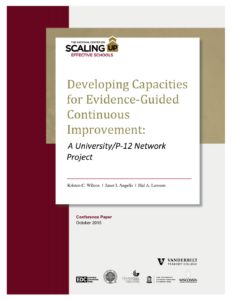2015 Developing Capacities for Evidence-Guided Continuous Improvement
This presentation presents on a study that investigated school leadership team participants’ perceptions of an intervention called COMPASS. COMPASS engages teams from different schools and districts in activities to identify strengths, weaknesses, and priorities then engage in an inquiry cycle of implementing action plans, gathering data and interpreting evidence in order to reach targeted goals.
This qualitative multiple case study contributes to the growing body of translational research that
seeks to better understand what is needed to develop capacities for evidence-guided continuous
improvement in P-12 settings. The study investigated school leadership team participants’
perceptions of an intervention called COMPASS. COMPASS engages teams from different
schools and districts in activities to identify strengths, weaknesses, and priorities then engage in
an inquiry cycle of implementing action plans, gathering data and interpreting evidence in order
to reach targeted goals. Two-hundred and twenty-eight district and school leaders and
instructional staff from 36 school teams provided reflections on the intervention revealing the
majority reported increases in competence in all dimensions of evidence-guided decision
making, from priority and goal setting to identifying potential research-based levers to
improvement as well as increased capacities for school- and district-wide action planning and
progress monitoring. Observation field notes, documentary evidence, and interviews with school
leaders also indicate that the process fundamentally shifts educators’ focus on systemic changes
to achieve system-wide targeted goals. Implications for theory, future research, and
considerations for those interested in university/P-12 partnerships for continuous improvement
are discussed.

